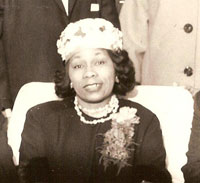Louise Shropshire
“Someday, somebody’s going to do something with my music.” These were the last words uttered by Louise Shropshire, a Cincinnati choir director and composer.
Somebody did do something with her music. One of her hymns became the anthem of the civil rights movement. In fact, 300,000 somebodies sang it as they marched on Washington in 1963. President Johnson quoted it in his speech following the Selma march for voting rights in 1965. Martin Luther King Jr. repeated it in his final sermon and its words were cried during his funeral: “We Shall Overcome.”
From left: Maurice McCrackin, T.L. Lane, Fred Shuttlesworth Sr., Venchael L. Booth, Martin Luther King Jr., Louise Shropshire, and Otis Moss Jr.
Louise Jarrett was the daughter of sharecroppers and the granddaughter of former slaves. Her family moved to Cincinnati in the 1920s when she was a child. She married a successful bail bondsman, Robert Shropshire, and settled into an affluent life in Cincinnati.
Louise and her husband became leaders in the African-American community. She helped establish Greater New Light Baptist Church, which became an instrumental meeting place. She led the choir, using her hymns to inspire the congregation and establish herself as a noted gospel artist.
The Shropshires often used their funds to bail out activists who had been jailed during protests. It was during these travels that Louise was introduced to Martin Luther King Jr. The two quickly developed a strong friendship.
To learn more about Louise Shropshire, read "A leading lady with a leading voice" or visit the online exhibit of the University of Cincinnati’s Louise Shropshire Collection.
In the comfort of the Shropshires’ home in Mt. Auburn, King first heard the lyrics that he would eventually use to empower civil rights activists across the nation. He often stayed with the family while he traveled Ohio. During one visit, Louise sat down to her piano to sing him an inspiring tune she had just written, “If My Jesus Wills.” King asked her if he could use the words in the chorus of the song.
From left: Robert Shropshire Sr., Louise Shropshire, Martin Luther King Jr., and Fred Shuttlesworth Sr.
Many do not realize that the three important words that ignited a movement were written by a humble Cincinnati woman. In fact, until recently, Louise had never officially been credited with being the original source of “We Shall Overcome.” Now, she has her own place in the
Ohio Civil Rights Hall of Fame .
Louise Shropshire was content in lending a hand—whether it meant raising funds to bail out activists or simply singing a song to her close friend. The
legacy she left is not one to be forgotten. It goes to show that no matter how big or small one’s role may be, one contribution makes a difference and could change history forever.

